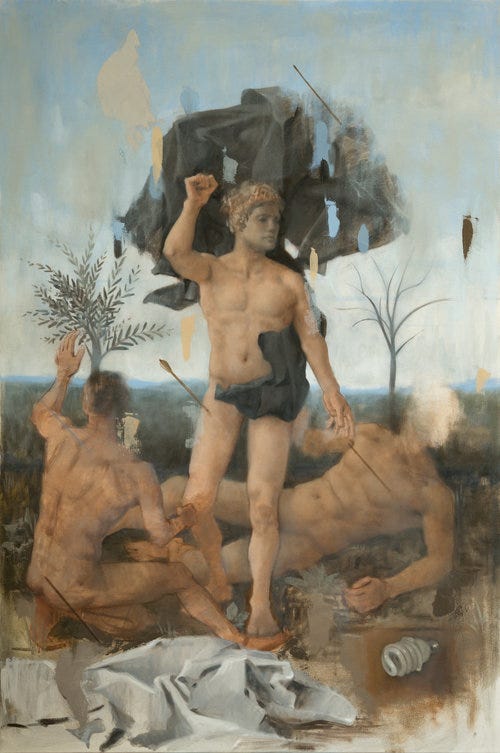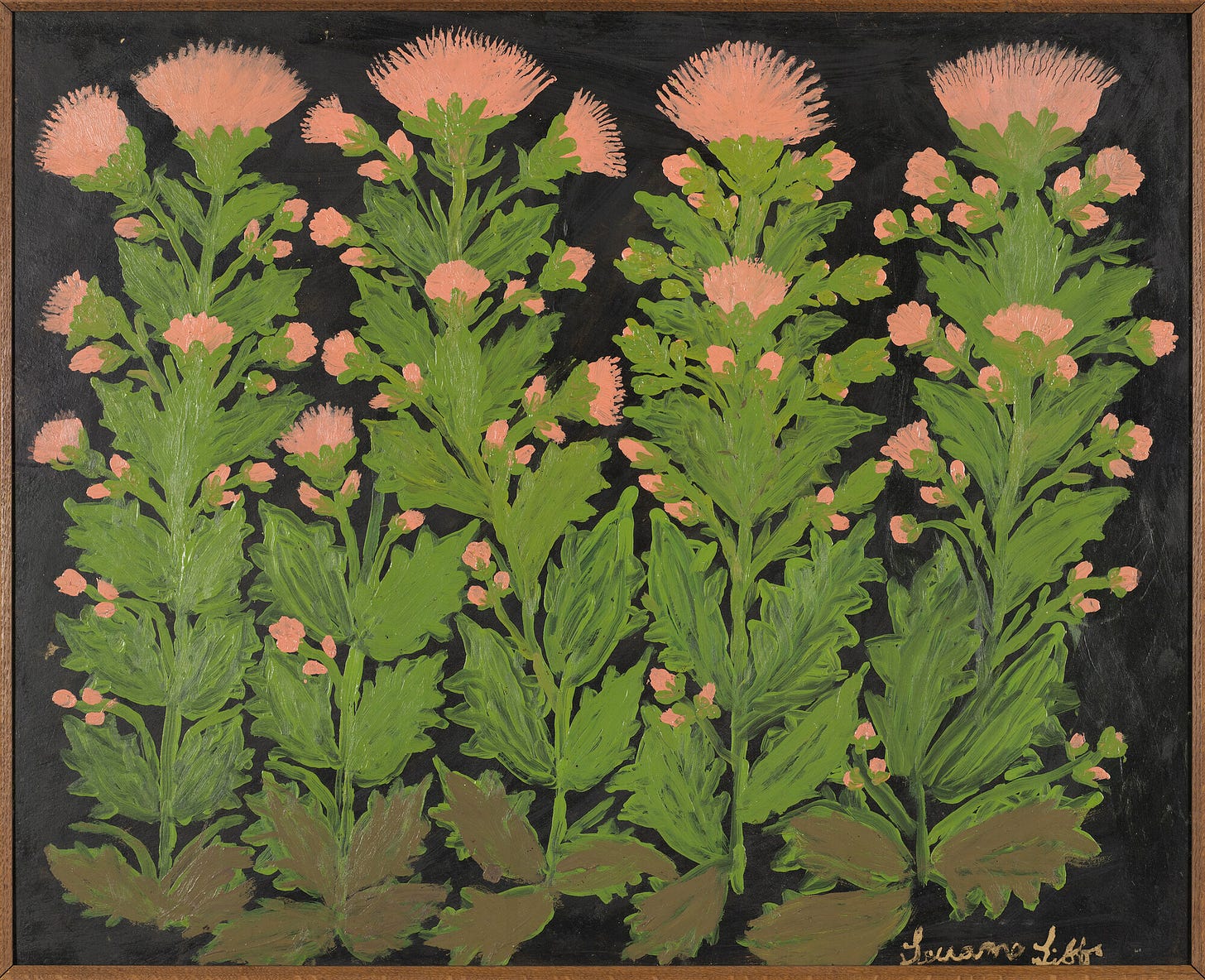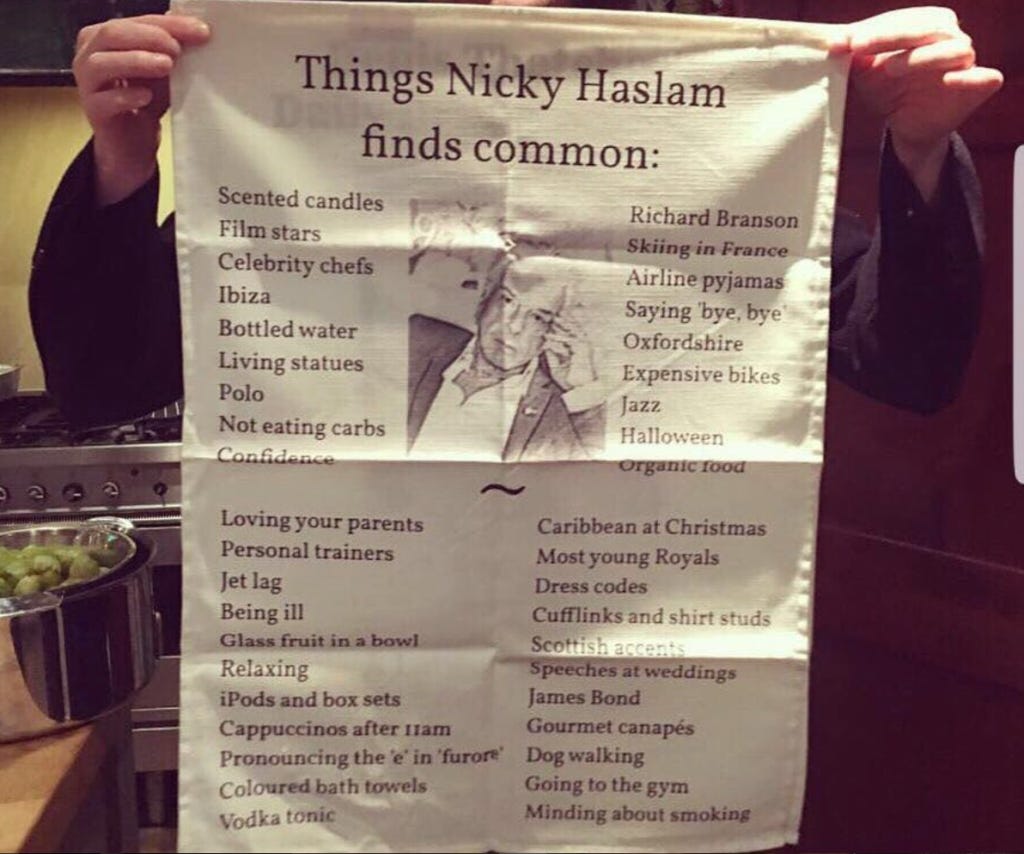Interesting Times No. 3
Congressional fan-fiction; inaccessible French TV; a man without a memory; art forgery; AI; Europe's last Communist state; new books
Hello! Welcome to Interesting Times No. 3, and welcome to new subscribers. I’m here to recommend content that’s both new and old, highbrow (maybe?) and lowbrow, every fortnight - I hope you enjoy.

JOURNALISM
Some selfish and naughty people had a big, illegal party in locked-down Auckland at the weekend - the rest of the city/country felt outrage, disappointment, betrayal, and also possibly (for Aucklanders) a slight longing (?) to go to a party. Anyway, Madeleine Chapman, who wasn’t at the party has reviewed it. “I […] was transfixed by the footage. An Auckland party hasn’t been documented in over two months. Thousands of New Zealanders have been denied the pleasure of sidestepping a pashing couple in the hallway on their way to the bathroom for far too long. Amid all the very justified anger and disappointment at these people’s actions, an important question has gone unanswered. Was the party worth it?”
“An underwater mystery on Canada’s coast. Tens of thousands of wooden stakes poking up from British Columbia's shoreline have smashed a long-held stereotype of Canada's First Nation people.”
“Today, artificial intelligence and information technologies have absorbed many of the questions that were once taken up by theologians and philosophers: the mind’s relationship to the body, the question of free will, the possibility of immortality. These are old problems, and although they now appear in different guises and go by different names, they persist in conversations about digital technologies much like those dead metaphors that still lurk in the syntax of contemporary speech. All the eternal questions have become engineering problems. On ‘a dog’s inner life: what a robot pet taught me about consciousness’.”
And these two philosophers argue that “AIs should have the same ethical protections as animals”.

I will admit to finding it quite (very, very) hard to understand the appeal of fan-fiction, but this article, “McDreamy, McSteamy, and McConnell: Congressional fan fiction is real, it’s glorious, and it might be reshaping our political world” was too hard to resist.
Photographs and interviews from an “Animal Blessing: At the Cathedral Church of St. John the Divine, pet owners brought their animals for an annual ceremony”.
“Eating Toward Immortality: Diet culture is just another way of dealing with the fear of death […] Humans are the only animals aware of our mortality, and we all want to be the person whose death comes as a surprise rather than a pathetic inevitability. We want to be the one of whom people say, ‘But she did everything right.’ If we cannot escape death, maybe we can find a way to be declared innocent and undeserving of it.”
I’m ashamed to say I’ve thought in this way - when a family friend was really ill, I thought “she ate organic vegetables and legumes - how can this have happened?” as if they were a talisman protecting her. On some level, because of her very healthy diet, I thought she didn’t deserve her illness. How ridiculous - illness as an indicator of morality. I would say one sees a lot of this with regards to “the obesity epidemic” and associated illness/disease; instead of seeing obesity as a symptom of larger societal issues including poverty and trauma, the individual is blamed. (A 2013 analysis of 57,000 women found that those who experienced physical or sexual abuse as children were twice as likely to be addicted to food than those who did not.) Again, illness as an indicator of morality, only this time it’s about sin and failing, and not goodness; assumptions are made about greed and lack of self-control, and the individual on some level deserving whatever illness their “greed” led them to.
“The Final Five Percent: If traumatic brain injuries can impact the parts of the brain responsible for personality, judgment, and impulse control, maybe injury should be a mitigating factor in criminal trials — but one neuroscientist discovers that assigning crime a biological basis creates more issues than it solves.”

Poor Queenie! Let the woman live, for god’s sake - she’s just like the rest of us, in need of a reward for getting through another day! (She’s not like the rest of us, but she should be allowed her martini.)
“Spies, lies and doublethink: Lea Ypi on growing up in Europe’s last communist state.“

Hiria Anderson, Kauta on Turongo St, 2021. Oil on canvas. This piece brought me to my knees. It is so rare to find someone who can write like this about mental suffering, probably because it’s almost impossible to put into words. “I’d wept deeply before my time in the hospital, and have since, though never for as long during a day, or over as many days, as I did in the quiet room. I went into the room, lay down on the mattress, and sobbed over my betrayal of my mother, over old loves, over my decision, when younger, to write, over the houses that we’d lived in when I was growing up, the friends that I’d made and then said goodbye to whenever we moved. I cried over our cats, Zelda, F. Scott, Justine, Pippin, the litters of kittens on blankets in boxes—so many cats. I’d held them, and slept in bed with them, and cradled them in my lap.”
Very poignant. I loved this. “The Great Work: On a small farm in Ontario, two old friends reimagine farm work as a sacred art form.”
The Bureau, declared by a Parisian newspaper as “the best French TV show ever made”, is the subject of this great piece by Chris Schulz (who has sadly given up writing his very enjoyable Substack (see the cat pee story in Interesting Times No. 1) to go and work at The Spinoff). Basically we can’t get The Bureau here in NZ, which is AN INJUSTICE, because a French newspaper has declared it the best, and why should we miss out on the best just because we live at the bottom of the world? Schulz’s piece has made me utterly determined to find and watch The Bureau online, and I will not stop until I have. (I would say the tech-savvy youth I live with are my best bet. And if anyone finds it online, please let me know.)

“Britney Spears is free from her father. Here’s how the #FreeBritney army celebrated.” And they are indeed a passionate, supportive and committed bunch.
“Searching for Mr. X. For eight years, a man without a memory lived among strangers at a hospital in Mississippi. But was recovering his identity the happy ending he was looking for?”
“Nicky Haslam’s House of Commons. Upon turning 80, the English decorator/arbiter/cabaret singer/socialite/poison pen gave up his storied country house, sold everything in it, published a book and opened a new chapter. […] Wealth displays are, in Mr. Haslam’s view, vulgar — or common, a term whose deployment he has parlayed into a personal franchise.”
And some genius has complied a list of all the things Haslam finds common, and put them on a tea-towel. (Have just discovered there are in fact 3 x tea-towels - am behind the times.) Here’s the first one. My faves are jazz, dog-walking, jet lag, being ill, relaxing, speeches at weddings, confidence, Richard Branson (he goes without saying, really) and living statues. Sadly though, I do get ill a lot, get pretty jet-lagged (interestingly, my sister-in-law doesn’t believe in jet-lag), love my parents, relax as often as possible, did have an iPod, and had a vodka tonic just before lockdown. Thoughts on the list, and disagreements/agreements with it, very welcome in the comments.
BOOKS
“The Endless Life Cycle of Book Cover Trends. What you see on a cover is the product of intermingling cultural and economic forces [and] the current book cover trend is highly influenced by what publishers and sales teams think is ‘Instagram-friendly’.”
BOOKS I’VE READ RECENTLY AND RECOMMEND: Minority Feelings: An Asian American Reckoning by Cathy Park Hong; Corrigan by Caroline Blackwood (looking forward to Great Granny Webster next, by the same author; apparently it’s a “shocking, brilliant, and wickedly funny novel that offers a behind-the-scenes look at the lives of eccentric aristocrats” (!!) and is Blackwood’s masterpiece); One of Them: An Eton College Memoir by Musa Okwonga; Missing Persons by Steve Braunias.
Here’s an interview with Dave Eggers, who is so incredibly talented it’s silly. I’ve enjoyed his narrative fiction, What is the What and Zeitoun, enormously; his memoir, A Heartbreaking Work of Staggering Genius; and particularly his novel A Hologram for the King - which I can’t recommend enough. As someone said about A Hologram, “Eggers maintains an exquisite balance of irony, empathy, dark humor, and unexpected tenderness in this taut exploration of the ever-increasing price of ordinary survival. A book as heartbreaking as the global economy it explores with such beauty and ferocity.” GET YOUR COPY TODAY!
Anyway, back to the interview with Eggers - in it he discusses his most recent novel, The Every, which is a follow-up to his 2013 novel, The Circle, “and a startling satire of our tech-drugged existence.” Recommend! (The interview -haven’t read the book yet.)
UPDATE! If you read the last edition’s books bit (wanted to say “books section” but that sounds a bit grandiose), you’ll know Jonathan Franzen’s Crossroads was on my want-to-read list - I now have a copy, so will report back when I’m done.
Some new book recommendations , and “East African writers laud Abdulrazak Gurnah” who was just awarded the Nobel prize for Literature!
PODCASTS
The High Low podcast has sadly ended (after 152 episodes) but it remains one of the most joyful, interesting, fun things I’ve ever listened to, and if you haven’t yet listened to hosts Dolly and Pandora (yes, they are posh; yes they are aware they are posh) cover the gamut of popular culture, then I envy you. (I still listen to old eps when in need of a cheer-up).
“How to spot a perfect fake: the world’s top art forgery detective. Forgeries have got so good – and so costly – that Sotheby’s has brought in its own in-house fraud-busting expert.”
“Floodlines: The story of an unnatural disaster. Floodlines interweaves the voices of survivors of [Hurricane Katrina] into its main narrative: a concise yet thorough history of Katrina, which examines the human errors that made a manageable Category 3 storm so needlessly brutal.”

Thanks for reading - see you in a fortnight.
-Ellie






Also, ooof, that peice 'finding a way back from suicide'. So heartbreaking, and beautiful. It made me wonder what the experience of psychiatric in-patient wards are in NZ - I know there's been a lot of criticism of the buildings/spaces themselves....
Great artwork selection! If I do say so myself! I'm looking forward to what you think of Johnathan Franzen's novel. I've only read some of his climate changey articles. Do you have any novles of his you recommend? Esther